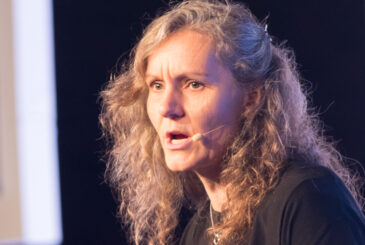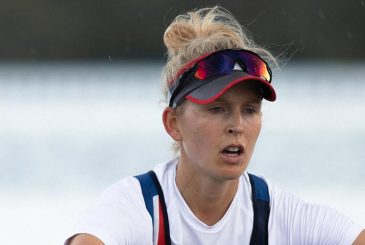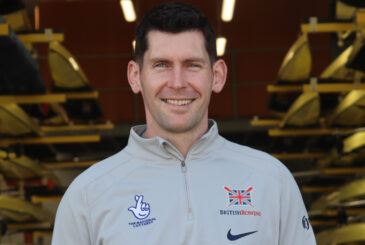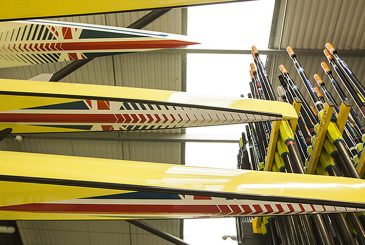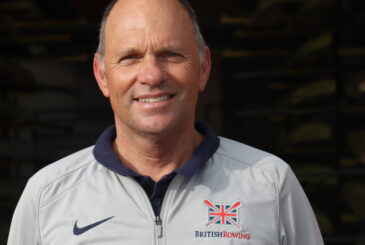Continuing our series spotlighting iconic Olympic and Paralympic finals, Martin Cross talks to Tom Aggar who won a historic gold in the inaugural rowing competition at the 2008 Paralympics in Beijing
Tom Aggar burst on the Para rowing scene in 2007, when he defeated Australia’s Dominic Monypenny, the reigning world champion at the Munich World Championships. It was a stellar introduction to the sport for a man who had only recently taken up Para rowing. For Aggar, it seemed like the stars had aligned at just the right time because at the Beijing Games of 2008, rowing would be included in the Paralympic programme for the first time.
However, the route to his Paralympic final would not be easy, as Martin Cross found when he got together with Tom Aggar to talk about those memorable Games and how they affected Aggar in his long career as Britain’s top PR1 oarsman.
Tom: The starting point was in 2007 when I’d gone to Munich as a complete unknown. The goal was to topple Dominic Monypenny, the reigning double world champion. I’d only been training for a year and a half. I have to admit that I was a little bit in awe of him. When I beat him in Munich it was like next year in Beijing, this guy’s going to come back and get revenge – it’s going to be me versus Dominic Monypenny. I spent quite a lot of time that Beijing season feeling like I was being chased, but in 2008, I had another really good season getting quicker and quicker.

Martin: So, how much you did you race your opposition in the Beijing season?
Tom: We did a couple of World Cups. In Poznan, I broke the world’s best time there and I managed to dip under five minutes for the first time. It was a sort of a barrier that I was trying to get to for the 1km distance. Dominic Monypenny hadn’t come to any of the World Cup events, or Varese. So, in my mind, he was the man to beat.
I’d had a really good run. I’d just blown away the competition and was getting quicker and quicker. As it turned out, I never raced my main opposition for the Paralympic medals during the season.
“I was hitting some big splits off the start and thinking: am I overcooking this here?”
Martin: How was your training camp before the Games?
Tom: I had a spell leading up to the Games with a stress fracture in a rib. I remember being quite ‘angsty’ having to lay off for about a week, but the pre-Games camp in Banyoles was good. We were pushing the boundaries of what we thought was possible to do every day. Chad [King] set his sights really, really high and we had a good team with Helene, [Raynsford], James [Roberts] and Karen [Cromie] in the double and then obviously the mixed coxed four as well.
Martin: I guess while you were in Banyoles, the Olympics were on at the same time. Did you have much of a chance to watch them?
Tom: Chad modeled his programme on what the Olympic guys were doing, so we’d come off the water, and it’d be a quick rush to get the blades back because, you know, Alan Campbell’s got his semi-final, or whatever it might be.
It was pretty inspiring, and I think a bit strange because we were a new team and in the Paralympic team we were almost starting to merge with the Olympic team at that time. To watch people that you’ve trained around, and alongside generally, do really well was pretty amazing.
Martin: So, was your target the gold medal?
Tom: The goal was always to go there and try and win. So that was the mindset for the whole year. In British Rowing it’s been about the gold-medal mindset. That was the expectation to try and be the best nation and that was the sort of the ethos of the team: we need to keep driving the standard up and up, and just keep pushing wherever we could.
Martin: What do you remember about traveling out to Beijing and arriving there?
Tom: It was a massive adventure. It was weird because I never really dreamt of going to a Games. I’d had this terrible accident and wanted to get fit again. So, exploring a new sport meant it was a whirlwind sort of three years, right from being injured to being selected for a Games.
To me it seemed like this massive opportunity that I had to take and grab with both hands. I felt quite a lot of confidence going in, knowing that I pretty much had done everything I could.
We stayed in the village. There was a 45-minute journey in between the course and the village. I remember that bus journey with police escorts and all sorts and having those lanes completely clear of traffic. It was pretty exciting and having never been to a Games – the scale of it, blew me away.
Martin: So how was your heat?
Tom: There were a couple of new faces I hadn’t seen before – the Chinese guy [Yeteng Tan] and Oleksandr Petrenko from the Ukraine. I still thought Dominic Monypenny was going to be the main challenge. It was quite nice tail wind conditions, really warm and I felt comfortable in the heat.
I was a lot bigger, taller more physical and just way better prepared than a lot of the field and I won that first heat pretty comfortably. On percentage terms I was naturally a lot quicker in the tail wind, so I thought I can really maximise the speed here.
However, looking at the other heat, me and Petrenko were within a second of each other and that’s when I knew it was going to be a pretty serious race, because I knew I hadn’t backed off that much in the heat.
Martin: What happened to Dominic Monypenny?
Tom: I don’t think he travelled well into the Games, and he had a little bit of illness, so he just didn’t feature. He was in an outside lane for the finals.
Martin: Tell me about the final…
Tom: That day it was a holding head wind, so I knew it was going to be tough. I remember out on the start line I could hear Helene’s medal ceremony while I was warming up. So, I remember knowing that she’d won before I started the race and just thinking that it’s my turn now.
I was quite explosive off the start, so I was able to nudge out in front and see people. It gave me so much confidence. I knew if I was just able to get out in front and to see someone in my periphery, I would be able to hold them off.
I was hitting some big splits off the start and thinking: am I overcooking this here? This is not something that I’d normally see in these conditions, but it didn’t feel like I was in front by very much at that point and I could just see him [Petrenko] in my periphery. I remember thinking, okay, I just need to hold him to halfway.
At halfway I was in a pretty bad way physically. I thought I’m really going to have to dig deep to hold on. I remember coming into the last 250m, him still being there and thinking: this guy is not going to break.
I managed to start to nudge out to a length and have a little bit of clear water as we were coming into the last 200m. And then, I had that feeling of, yeah, I’m starting to pull away; I certainly wasn’t getting any quicker, but he was starting to really tire at that point.
“You know, for those few moments I just felt like a sort of mini celebrity”
Martin: What was it like to cross the finish line?
Tom: Just an incredible wave of emotion. There’s this wave of elation and just relief that you’ve done something.
Three years before, I was on a spinal board in a hospital bed and trying to get back to some sort of life again. Finding this opportunity and something that I was reasonably good at – and working incredibly hard for a couple of years at it in a really inspiring team was amazing.
I had put everything into it – my heart and soul, and to come out with that was just indescribable.
Martin: How did that result, affect your life after that?
Tom: It’s definitely stuck with me and will stick with me forever. I think having that result – it just gave me such a basis of confidence. To think that if you set your mind to something and set your sights so high; those opportunities are there for the taking…
It’s given me a sort of a quiet confidence in life to go on and try and tackle other things.
In Beijing, I remember going to the Bird’s Nest stadium and watching some athletics. I had the medal with me in my pocket. There were loads of Chinese spectators. I was with my brother, and he said: put your medal on. Within 20 seconds there was this huge crowd around me. People were coming with their children to take photos. And, you know, for those few moments I just felt like a sort of mini celebrity.
The Chinese public was just almost in awe. They were queuing up to just speak with you and share a moment with you and have a photo and have a look at the medal. The impact of what something like that could have on other people as well, took me completely by surprise.
Martin: How did Beijing fit into the rest of your career as a Para rower?
Tom: I came fourth in London 2012 and fourth in 2013 [at the Worlds] and I really started to question if I was on the way out, but Tom Dyson and Nick Baker worked with me to show me how I could squeeze out little improvements.
I definitely learnt the most between London and Rio. I was actually in my best shape physically in Rio, even though we came away with a [Paralympic] bronze medal. I’d learnt how to get the most out of myself.
Illustration: Syahrulhart / Fiverr



